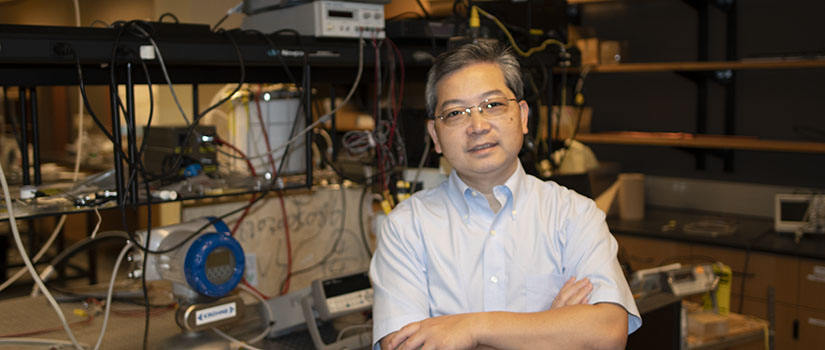Research on gravitational impact to allow greater efficiency in space missions
Mechanical Engineering Professor Chen Li (PI) and Computer Science Professor Yan Tong (co-PI) have received a grant from the Center for the Advancement of Science in Space and the National Science Foundation to study gravitational effects on flow boiling, allowing their research methods to be conducted on the International Space Station (ISS). The research is the first of its kind due to the challenges and prohibitive costs of conducting experiments at various levels of gravity.
“Flow stability is a huge issue, so our experiments at various levels of gravity will help determine how to make the process more efficient and controllable.”
- Chen Li, Mechanical Engineering
Their research will use both experiments and machine learning (ML) techniques to establish a framework of gravity’s effect on flow boiling, a mechanism with important applications on land and in space. The team will conduct initial research locally before testing is performed on the ISS by project partner ZIN Technologies, Inc., a provider of advanced engineering services and product development solutions for NASA, the U.S. Department of Defense and private industry.
“We are very excited to see the results of this study. A thorough understanding of long-term flow boiling in microgravity has not previously been established, so its applications in space missions are limited,” Li says. “This research will greatly advance the potential of flow boiling in microgravity.”
Flow boiling occurs when liquid is heated over its boiling point, a process that is more efficient than regular pool boiling of liquid due to the forced flow. On Earth, essential applications include thermoelectric power generation, water purification, and heating, cooling and air conditioning systems. However, it is affected significantly by forces such as surface tension, inertia, shear, vapor evaporation momentum and gravitational force. The variability of these forces results in drastic changes of flow boiling patterns and hence, performance.
For future space missions, the same efficiency could play an essential role, aiding functions such as cryogenic propellant storage and transfer for long-term deep space missions, high-density power generation, and control of temperature and humidity for long-term manned space bases. But researchers must first ensure that flow boiling can work perfectly in a microgravity environment.
High-fidelity models will be developed to understand and predict the effects of major forces on flow boiling through the combined use of high-resolution ground and microgravity experiments and ML-based techniques. The models are designed to not only predict flow boiling characteristics but also create synthetic images of flow patterns for the first time, paving the way for performing virtual flow boiling experiments under a wide range of working conditions in the future.
The desired result is a valuable platform through which researchers can study flow boiling and design devices for future space missions without conducting extremely expensive experiments in space.
“Once we can quantify how gravitational differences affect flow boiling, we hope to use the newly developed models to design flow boiling systems in space,” Li says. “Flow stability is a huge issue, so our experiments at various levels of gravity will help determine how to make the process more efficient and controllable.”
Chen Li is a professor of mechanical engineering in the College of Engineering and Computing. His research interests are micro/nano-scale two-phase heat and flow physics, prediction, control and modeling. Yan Tong is an associate professor of computer science and engineering in the CEC. Her research interests are on computer vision, machine learning and human computer interactions.
